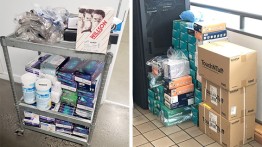Cooper Community Donates Critically Needed Supplies
POSTED ON: March 23, 2020

In response to a call for the donation of Personal Protective Equipment (PPE) made by Governor Andrew Cuomo, members of The Cooper Union community have collected and delivered critical gear to hospitals bracing themselves for possible shortages of necessary equipment.
At the behest of President Laura Sparks, Torey Boyd, Cooper’s facilities manager, coordinated with Natalie Brooks, the school's chief talent leader, to find strategies for keeping Cooper clean and safe while finding ways to help the larger New York community. “We collectively asked that each department give unused gloves and masks to us so we can make a donation,” Boyd said.
As it happened, Professor Andrea Newmark, chair of the chemistry department, had circulated news of a web site dedicated to matching donors of PPE to the people and institutions that need them. Professor Ruben Savizky, campus-wide faculty safety coordinator, Christian Carter, chemistry lab technician, and Radmila Janjusevic, adjunct professor and biomedical engineering lab tech, came to Cooper over the weekend. They scoured the chemistry stockroom, the chemical engineering lab, and the Kanbar Center for supplies that could be needed by area hospitals. They collected one box of N95 masks, 26 boxes of nitrile gloves, two containers of disinfecting wipes, and 16 pairs of goggles. Via the PPE Link web site, they were matched that same day with Columbia Presbyterian Hospital.
According to Professor Savizky who also serves as the School of Engineering's acting associate dean of academic affairs, “Sara Kass-Gergi, a physician there, responded that they could use them and could pick up the equipment.” On Sunday Dr. Kass-Gergi’s sister retrieved the supplies and delivered them to the Upper East Side hospital.
Meanwhile the lab technicians in the School of Art and The Irwin S. Chanin School of Architecture immediately answered a call put out by Emmy Mikelson, manager of technicians, who had been contacted by Dean Mike Essl and Adriana Farmiga, associate dean. In an email, Ms. Mikelson asked for any useful materials to be collected and left at the guard’s desk in the Foundation Building. She wasn’t surprised to find that staff responded enthusiastically. “Our technical staff that were able to travel to campus collected gloves and masks—I believe we specifically had N95 masks—from their shops and labs for donation,” Ms. Mikelson said. “It was a collaborative effort across all the areas: Photography, Film/Video, Printmaking, Art and Architecture Shop, and the Painting Office.”
On Sunday, Mr. Boyd, Dean Gunnison, and Gerald Love—both of the maintenance team— collected the supplies collected by the technical staff, which totaled 101 boxes of gloves, ranging in size from small to extra-large, and 40 masks.
Mr. Love volunteered to drive the team and the supplies to the Jacob Javits Convention Center, which is being converted into a temporary hospital during the COVID-19 crisis. Getting the goods where they needed to be wasn’t so straightforward: “We spoke with a few soldiers about how to drop things off, but no one knew much.” Eventually, though, they called the security team at Javits and dropped off the items, making Cooper the very first institution to make a donation at that site.




